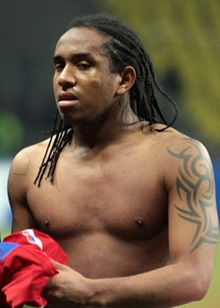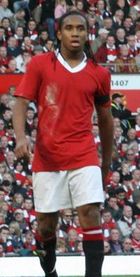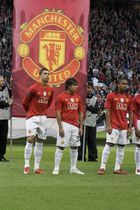Anderson Luís de Abreu Oliveira
 |
||||||||||||
| Personal information | ||||||||||||
|---|---|---|---|---|---|---|---|---|---|---|---|---|
| Full name | Anderson Luís de Abreu Oliveira | |||||||||||
| Date of birth | 13 April 1988 | |||||||||||
| Place of birth | Porto Alegre, Brazil | |||||||||||
| Height | 5 ft 9 in (1.75 m)[1] | |||||||||||
| Playing position | Midfielder | |||||||||||
| Club information | ||||||||||||
| Current club | Manchester United | |||||||||||
| Number | 8 | |||||||||||
| Youth career | ||||||||||||
| 1993–2004 | Grêmio | |||||||||||
| Senior career* | ||||||||||||
| Years | Team | Apps† | (Gls)† | |||||||||
| 2004–2005 | Grêmio | 19 | (6) | |||||||||
| 2005–2007 | Porto | 18 | (2) | |||||||||
| 2007– | Manchester United | 55 | (1) | |||||||||
| National team‡ | ||||||||||||
| 2005 | Brazil U17 | 5 | (2) | |||||||||
| 2008 | Brazil U23 | 5 | (1) | |||||||||
| 2007– | Brazil | 8 | (0) | |||||||||
|
Honours
|
||||||||||||
| * Senior club appearances and goals counted for the domestic league only and correct as of 21:00, 15 May 2010 (UTC). † Appearances (Goals). |
||||||||||||
Anderson Luís de Abreu Oliveira (born 13 April 1988), best known as Anderson, is a Brazilian footballer who currently plays as a midfielder for Manchester United and the Brazil national team.
Anderson began his career with Grêmio, joining the youth team before rising through the ranks. His goal against Nautico during the 2005 play-offs gained Gremio promotion to the Brazilian Série A. Before the start of the 2005–06 season, Anderson moved to Porto, gaining first team status during his two seasons with them. There, he won the Portuguese Liga twice, along with the Portuguese Cup and SuperCup during 2005–06. He moved to Manchester United for a transfer fee of around £18 million before the 2007–08 season, and has won the Premier League twice, the 2007–08 UEFA Champions League and the League Cup.
Anderson made his Brazil debut in 2007 during the 2007 Copa América, which they went on to win. He also played for the Brazil Olympic football team during the 2008 Summer Olympics in Beijing, helping them secure the Bronze medal.
Contents |
Club career
Grêmio
Born in Porto Alegre, Anderson joined Grêmio as a youth player and in 2004 he made his first appearance for the team, playing 5 Brazilian Série B games in the second half of the year, as well as playing in the 2005 Gaúcho State Championship in the first half. He earned himself iconic status by scoring the goal that lifted Grêmio back into Serie A in a promotion playoff against Nautico. This goal was particularly memorable because Grêmio only had seven players on the pitch at the time and had just seen the opposition have a penalty saved. The goal gave Grêmio a 1–0 victory in the most unlikely of circumstances.[2]
Porto
He joined Porto in December 2005 after only five first team appearances at a national level with Grêmio, and made his league debut on 5 March 2006, playing a part in helping the team seal the Portuguese Championship that season. The following season, he made his UEFA Champions League debut in Porto's first group game against CSKA Moscow.[3] However, Anderson was forced to miss five months of the 2006–07 season due to a broken leg, as a result of a tackle by Benfica's player Kostas Katsouranis.[4]
Manchester United

On 30 May 2007, the Manchester United website confirmed that the club had agreed in principle to sign Anderson from Porto for an undisclosed fee, reported to be approximately £18 million.[5] On 29 June 2007, he was granted a work permit to play in the United Kingdom, and the move was completed on 2 July, with Anderson signing a five-year contract to become United's second Brazilian player after the disappointing Kléberson.[6]
Anderson was friends with Portuguese-speaking team-mates, Cristiano Ronaldo and Nani prior to joining the club.[7] He was handed the number 8 shirt previously worn by Wayne Rooney (who changed to number 10) and made his Manchester United debut on 3 August 2007, playing 45 minutes of a pre-season friendly against Doncaster Rovers, which United won 2–0.[8]
On 1 September 2007, Anderson made his competitive debut for United against Sunderland, before he was substituted at half time and replaced by Louis Saha, who eventually got the winner.[9] Anderson made his Champions League debut against Sporting CP in a 1–0 away win on 19 September 2007, coming on as a substitute for Ryan Giggs in the 76th minute.[10] On 26 September 2007, Anderson made his League Cup debut, playing the full 90 minutes in a 2–0 loss to Coventry City, in a team consisting almost entirely of youth and reserve team players.[11]
In the 2008 UEFA Champions League Final in Moscow, Anderson was brought on as a substitute in the final minute of extra time to replace Wes Brown, and converted United's sixth attempt in the penalty shootout. United won the game 6–5 on penalties to give Anderson the first European honour of his career.[12]

On 21 December 2008, Anderson played 88 minutes of the 2008 FIFA Club World Cup Final, which United won courtesy of a single Wayne Rooney goal, thus confirming them World champions.[13] On 1 March 2009, Anderson came on in the 56th minute of the 2009 League Cup final against Tottenham, replacing Danny Welbeck. He went on to score the winning penalty in the penalty shootout, winning his first League Cup medal.[14] On 18 May 2009, in the penultimate game of the season against Arsenal, United only needed one point to seal their third successive Premier League title and Anderson's second in two years at the club. Anderson was brought on for Wayne Rooney in the final minute, helping United lift the title at home to their fierce rivals.[15]
Anderson scored his first goal for Manchester United in the Audi Cup friendly tournament against Boca Juniors on 29 July 2009. After United were awarded a free kick on the right side of the penalty area, Anderson stepped up and curled the ball into the far top corner of the goal with his left foot.[16] On 12 September 2009, Anderson went on to score his first competitive goal for Manchester United against Tottenham Hotspur on his 78th appearance for the club. He latched onto a loose ball at the edge of the area and hammered the ball into the bottom right corner with his left foot, scoring United's second goal of a 3–1 league win at White Hart Lane.[17]
In January 2010, Anderson was believed to have returned home to Brazil without Ferguson's permission and fined £80,000 by Manchester United.[18] He returned to the first-team for a match against West Ham United on 23 February,[19] but after just 20 minutes of the match, Anderson ruptured the cruciate ligament in his left knee and had to be substituted by Park Ji-Sung. He was later ruled out for the remainder of the season, as well as the 2010 FIFA World Cup, after analysis determined that he would be out for the next six months.[20]
It was reported that Anderson was hospitalized after a serious car crash in Portugal on 31 July 2010. He had spent the night before at a nightclub before leaving in his Audi R8. The crash occurred at 7am when the car came off the road and hit a farm wall before entering a field. Anderson was unconscious but was pulled out from the car just before it exploded. Another man and a woman were also in the car. All three suffered minor injuries and were treated for whiplash, concussion and shock at a hospital. Anderson will reportedly return to United to continue his rehabilitation. [21] On 20 August 2010, Sir Alex Ferguson confirmed that Anderson had returned to training and could be part of the team that features away to Fulham on 22 August.[22]
International career
In April 2005, he played for Brazil in the South American U-17 Championship. The following October he featured in the 2005 FIFA U-17 World Championship along with Marcelo of Real Madrid and Denílson of Arsenal and he won the Golden Ball as Brazil took silver.[23]

When Brazil were in trouble of going out of the tournament after their opening game defeat against Gambia, Anderson helped to turn their fortunes around in the next match against the Netherlands. Anderson played well against the Dutch, contributing crosses and runs that aided his side. Anderson kept up his level of performance after that, scoring one goal and playing a key role in others, notably setting up Ramon for the first strike against Korea DPR in the quarter-final. After helping to lead Brazil into the final after a 4–3 semi-final victory over Turkey, Anderson lasted only 15 minutes of the final with Mexico, being stretchered off. Anderson made his international debut for the Brazil national football team on 27 June 2007 in their 2–0 loss against Mexico in Copa América, coming on as a substitute.[24] He made his first start for Brazil on 1 July 2007 against Chile in a 3–0 victory.
In July 2008, Brazil coach Dunga named Anderson in the 18-man squad for the 2008 Summer Olympics.[25] He scored Brazil's first goal in their second group match against New Zealand, a match they went on to win 5–0.[26] On 22 August 2008, Brazil won the bronze medal as they defeated Belgium 3–0.[27]
Career statistics
| Club | Season | League | Cup | League Cup | Continental | Other[28] | Total | ||||||
|---|---|---|---|---|---|---|---|---|---|---|---|---|---|
| Apps | Goals | Apps | Goals | Apps | Goals | Apps | Goals | Apps | Goals | Apps | Goals | ||
| Grêmio | 2004 | 6 | 1 | 0 | 0 | – | 0 | 0 | 0 | 0 | 6 | 1 | |
| 2005 | 13 | 5 | 4 | 0 | – | 0 | 0 | 8 | 3 | 25 | 8 | ||
| Total | 19 | 6 | 4 | 0 | – | 0 | 0 | 8 | 3 | 31 | 9 | ||
| Porto | 2005–06 | 3 | 0 | 2 | 0 | – | 0 | 0 | 0 | 0 | 5 | 0 | |
| 2006–07 | 15 | 2 | 0 | 0 | – | 4 | 0 | 1 | 1 | 20 | 3 | ||
| Total | 18 | 2 | 2 | 0 | – | 4 | 0 | 1 | 1 | 25 | 3 | ||
| Manchester United | 2007–08 | 24 | 0 | 4 | 0 | 1 | 0 | 9 | 0 | 0 | 0 | 38 | 0 |
| 2008–09 | 17 | 0 | 3 | 0 | 6 | 0 | 9 | 0 | 3 | 0 | 38 | 0 | |
| 2009–10 | 14 | 1 | 1 | 0 | 3 | 0 | 5 | 0 | 0 | 0 | 23 | 1 | |
| 2010–11 | 0 | 0 | 0 | 0 | 0 | 0 | 0 | 0 | 0 | 0 | 0 | 0 | |
| Total | 55 | 1 | 8 | 0 | 10 | 0 | 23 | 0 | 3 | 0 | 99 | 1 | |
| Career total | 92 | 9 | 14 | 0 | 10 | 0 | 27 | 0 | 12 | 4 | 155 | 13 | |
Statistics accurate as of match played 23 January 2010[29][30]
Honours
Club
- Grêmio
- Campeonato Brasileiro Série B (1): 2005
- Porto
- Portuguese Liga (2): 2005–06, 2006–07
- Taça de Portugal (1): 2005–06
- Portuguese SuperCup (1): 2006
- Manchester United
- Premier League (2): 2007–08, 2008–09
- Football League Cup (1): 2008–09
- UEFA Champions League (1): 2007–08
- FIFA Club World Cup (1): 2008
International
- Brazil U17
- South American U-17 Championship (1): 2005
- Brazil
- Copa América (1): 2007
Individual
- FIFA U-17 World Cup Golden Ball (1): 2005
References
- ↑ Hugman, Barry J. (2008). The PFA Footballers Who's Who 2008–09. Edinburgh: Mainstream Publishing. p. 31. ISBN 978-1-84596-324-8.
- ↑ Castles, Duncan (30 May 2008). "Anderson has no fear – on the field or in life". The Observer. Guardian News and Media. http://www.guardian.co.uk/football/2008/mar/30/newsstory.sport. Retrieved 30 May 2008.
- ↑ Hunter, Graham (13 September 2006). "Porto frustrated in CSKA stalemate". UEFA.com (Union of European Football Associations). http://www.uefa.com/competitions/ucl/fixturesresults/round=2357/match=1116326/index.html. Retrieved 20 June 2007.
- ↑ Kastrinakis, Antony (16 April 2008). "Anderson's Leg Break Hell". Sun Online (News Group Newspapers). http://www.thesun.co.uk/sol/homepage/sport/football/article1050349.ece. Retrieved 16 April 2008.
- ↑ "Transferts". L'Équipe. 10 July 2007. http://www.lequipe.fr/Portfolio/Football/PORTFOLIO_20062007_TRANSFERTS.html. Retrieved 13 July 2007.
- ↑ Bartram, Steve (2 July 2007). "Reds complete triple signing". ManUtd.com (Manchester United). http://www.manutd.com/default.sps?pagegid={B4CEE8FA-9A47-47BC-B069-3F7A2F35DB70}&newsid=440998. Retrieved 2 July 2007.
- ↑ Hibbs, Ben (30 May 2007). "United to sign Brazilian starlet". ManUtd.com (Manchester United). http://www.manutd.com/default.sps?pagegid={B4CEE8FA-9A47-47BC-B069-3F7A2F35DB70}&newsid=431940. Retrieved 30 May 2007.
- ↑ Thompson, Gemma (3 August 2007). "Doncaster 0 United 2". ManUtd.com (Manchester United). http://www.manutd.com/default.sps?pagegid={B4CEE8FA-9A47-47BC-B069-3F7A2F35DB70}&newsid=449970. Retrieved 2 July 2007.
- ↑ McKenzie, Andrew (1 September 2007). "Man Utd 1–0 Sunderland". BBC Sport (British Broadcasting Corporation). http://news.bbc.co.uk/sport1/hi/football/eng_prem/6963704.stm. Retrieved 1 September 2007.
- ↑ McNulty, Phil (19 September 2007). "Sporting 0–1 Man Utd". BBC Sport. British Broadcasting Corporation. http://news.bbc.co.uk/sport1/hi/football/europe/6999810.stm. Retrieved 19 September 2007.
- ↑ "Man Utd 0–2 Coventry". BBC Sport. British Broadcasting Corporation. 26 September 2007. http://news.bbc.co.uk/sport1/hi/football/league_cup/7008020.stm. Retrieved 26 September 2007.
- ↑ McNulty, Phil (28 May 2008). "Man Utd earn dramatic Euro glory". BBC Sport (British Broadcasting Corporation). http://news.bbc.co.uk/sport1/hi/football/europe/7406252.stm. Retrieved 28 May 2008.
- ↑ Bevan, Chris (21 December 2008). "Liga de Quito 0–1 Man Utd". BBC Sport (British Broadcasting Corporation). http://news.bbc.co.uk/sport1/hi/football/teams/m/man_utd/7793438.stm. Retrieved 21 December 2008.
- ↑ McNulty, Phil (1 March 2009). "Man Utd 0–0 Tottenham (aet)". BBC Sport (British Broadcasting Corporation). http://news.bbc.co.uk/sport1/hi/football/league_cup/7905889.stm. Retrieved 1 March 2009.
- ↑ McNulty, Phil (18 May 2009). "Man Utd 0–0 Arsenal". BBC Sport (British Broadcasting Corporation). http://news.bbc.co.uk/sport1/hi/football/eng_prem/8038259.stm. Retrieved 18 May 2009.
- ↑ "Valencia earns United victory". Sky Sports (BSkyB). 29 July 2009. http://www.skysports.com/football/match_report/0,19764,11065_3148782,00.html. Retrieved 29 July 2009.
- ↑ Stevenson, Jonathan (12 September 2009). "Tottenham 1–3 Man Utd". BBC Sport (British Broadcasting Corporation). http://news.bbc.co.uk/sport1/hi/football/eng_prem/8246783.stm. Retrieved 12 September 2009.
- ↑ "Anderson set to sign for Lyon". The Sun (News Group Newspapers). 29 January 2010. http://www.thesun.co.uk/sol/homepage/sport/football/2829825/Anderson-set-to-sign-for-Lyon.html. Retrieved 29 January 2010.
- ↑ Lyon, Sam (23 February 2010). "Man Utd 3–0 West Ham". BBC Sport (British Broadcasting Corporation). http://news.bbc.co.uk/sport1/hi/football/eng_prem/8526956.stm. Retrieved 25 February 2010.
- ↑ "Manchester United's Anderson to miss season with injury". BBC Sport (British Broadcasting Corporation). 25 February 2010. http://news.bbc.co.uk/sport1/hi/football/teams/m/man_utd/8536171.stm. Retrieved 25 February 2010.
- ↑ "Manchester United midfielder Anderson hospitalised after serious car crash". The Telegraph. 2 August 2010. http://www.telegraph.co.uk/sport/football/leagues/premierleague/manutd/7921643/Manchester-United-midfielder-Anderson-hospitalised-after-serious-car-crash.html. Retrieved 31 July 2010.
- ↑ Hibbs, Ben (20 August 2010). "Anderson returns to training". ManUtd.com (Manchester United). http://www.manutd.com/default.sps?pagegid={F9E570E6-407E-44BC-800F-4A3110258114}&newsid=6651532. Retrieved 20 August 2010.
- ↑ "FIFA U17 World Championship Peru 2005". FIFA.com. Fédération Internationale de Football Association. 2005. http://www.fifa.com/tournaments/archive/tournament=102/edition=9095/awards/index.html. Retrieved 20 June 2007.
- ↑ "Anderson gets Man Utd work permit". BBC Sport (British Broadcasting Corporation). 29 June 2007. http://news.bbc.co.uk/sport1/hi/football/teams/m/man_utd/6252368.stm. Retrieved 25 June 2008.
- ↑ "Ronaldinho gets Olympics go-ahead". BBC Sport (British Broadcasting Corporation). 16 July 2008. http://news.bbc.co.uk/sport1/hi/olympics/football/7494600.stm. Retrieved 30 January 2010.
- ↑ "Ronaldinho doubles up as Brazil whip N.Zealand". Agence France-Presse. 10 August 2008. http://afp.google.com/article/ALeqM5hcGBBL66lEJEBHoy3LvL5K3wy1og.
- ↑ "Ronaldinho leads Brazil to bronze". BBC Sport (British Broadcasting Corporation). 22 August 2008. http://news.bbc.co.uk/sport1/hi/olympics/football/7577449.stm. Retrieved 30 January 2010.
- ↑ Includes other competitive competitions, including the Portuguese SuperCup, FA Community Shield, UEFA Super Cup, Intercontinental Cup, FIFA Club World Cup
- ↑ Endlar, Andrew. "Anderson". StretfordEnd.co.uk. http://www.stretfordend.co.uk/playermenu/anderson.html. Retrieved 28 November 2009.
- ↑ "Anderson Database". footballdatabase.eu. http://footballdatabase.eu/football.joueurs..anderson.17097.en.html. Retrieved 11 August 2009.
External links
- Anderson career stats at Soccerbase
- Anderson PortuGOAL profile
- Profile at ManUtd.com
|
|||||||||||||||||||||
|
|||||